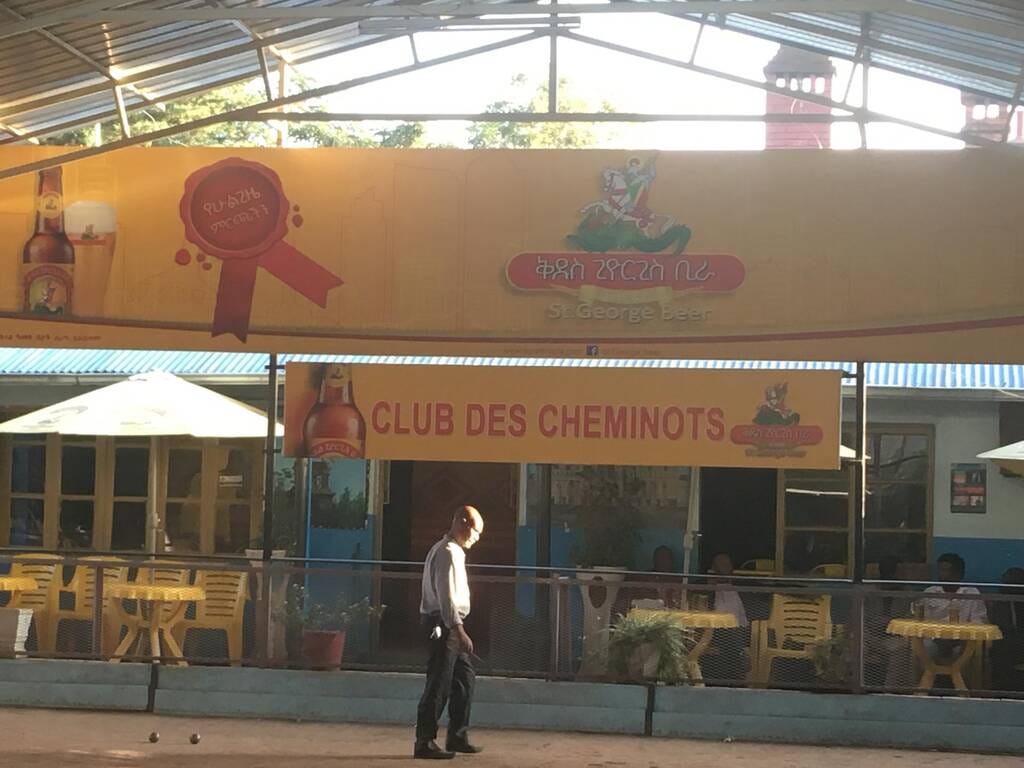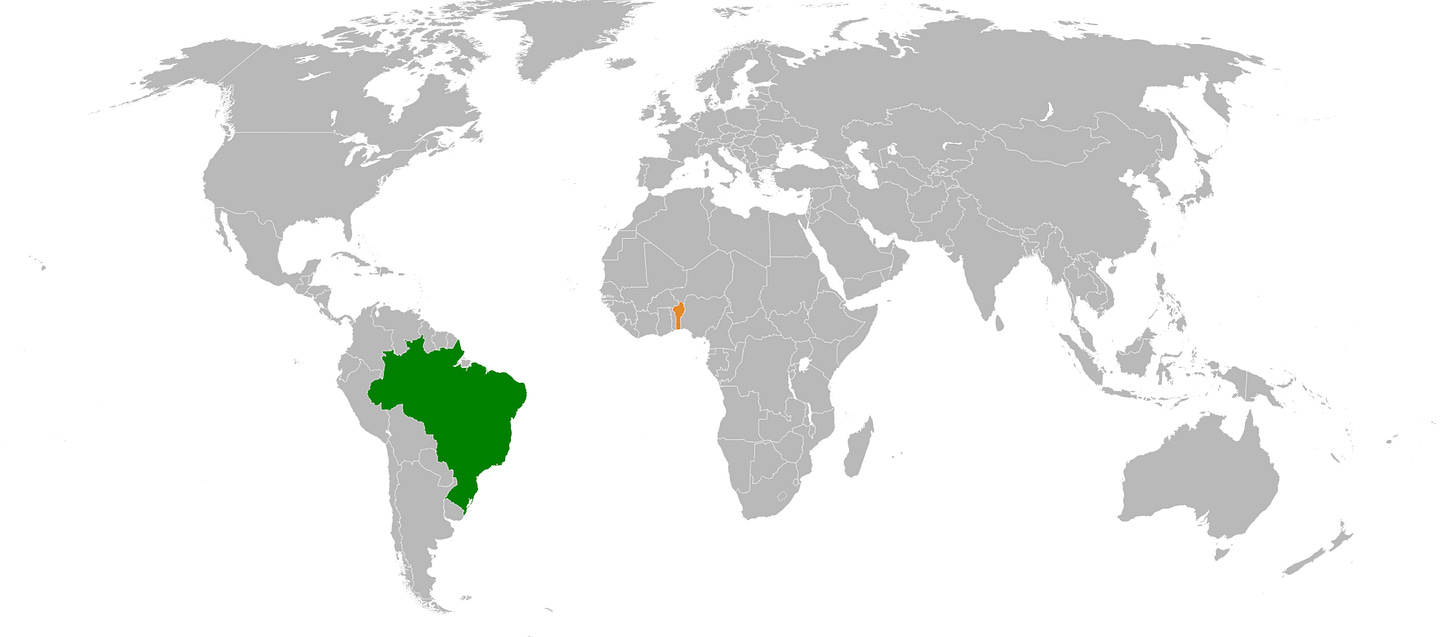
Good Morning from Cameroon!
Pétanque vs. Progress: The Changing Face of Addis Ababa

It’s Saturday afternoon in central Addis Ababa, and a handful of regulars are lobbing metal balls around in a game of pétanque. If that sounds more “Paris” than “Ethiopia,” well, that’s because this club has roots in the French-built Ethio-Djibouti Railway going back more than a century.
But now, a storm’s brewing over the Railway Workers’ Club (or Club des Cheminots), which sits on very prime real estate. Ethiopia’s government is on a mission to reimagine Addis Ababa as a gleaming, hi-tech metropolis—complete with modern apartments, ambitious bike lanes, and glossy new conference centers. It’s aiming to reposition itself as the Dubai of East Africa.
But all of that “progress” has pushed thousands of homes, shops, and cultural spots out of the way. Pétanque club members fear they’re next.
Most of the club’s 150 members are pensioners who worked on trains connecting Addis Ababa to the Red Sea (back when it ran on a French railway line). They picked up French from their expatriate colleagues—and also discovered the joys of pétanque, a gentle, boules-like game perfect for weekend hangs.

“This place is more than a game—it’s our community,” says Chebude, a former train driver who spent 15 years ferrying goods across Ethiopia’s highlands. He still drops by daily to hang with friends, play boules, and swap war stories of railway raids and flash-flood close calls.
The Bulldozers Are Coming
Thing is, the city is reshaping itself, block by block. Think high-rise towers and gentrification. Already, nearby neighborhoods have been leveled. Just across the street, developers have built a chic café into the old train station, where locals sip on cappuccinos among silent locomotives—part of a $1.8 billion plan by a major Emirati real estate group.
Club des Cheminots knows the writing’s on the wall: eventually, a bulldozer may arrive, official papers in hand. But for now, loyalists keep rolling their boules, hoping the next big project will look right past them. After all, they say, “progress” doesn’t have to mean erasing the city’s soul, does it?
It makes for a fascinating read, right here.
“Returning to Our Motherland”: Benin’s Citizenship Law Is Calling Brazilians Back Home

Standing in the bustling arrivals terminal in Cotonou, celebrity chef João Diamante felt an uncanny sense of coming home. Though he was thousands of miles from his birthplace in Rio de Janeiro, the drumbeats, the faces, and the coastal air of Benin kindled a deep recognition in him—like stepping into a house you’ve never seen yet somehow intimately know.
Diamante’s life story is entwined into Brazil’s African diaspora: he was raised in Salvador, a historic city recognized for its profound African heritage, a place often referred to as “the Blackest major city in Brazil.” His family’s heritage echoes the forced migration of millions of Africans who were brought to Brazil during the transatlantic slave trade. Today, a new twist in that centuries-old narrative is unfolding. Benin, under President Patrice Talon, has enacted a groundbreaking law that welcomes descendants of the enslaved—wherever they may live—to claim Beninese citizenship and return “home” if they so desire.
A Personal Calling
For Diamante, the idea of seeking Beninese citizenship resonates with his desire to reclaim a lineage severed by the horrors of slavery. “It’s about belonging, about who I am, where I come from, my lineage and my family,” recalling how his first step on Beninese soil felt instantly and powerfully familiar. While many aspire to European or U.S. passports, Diamante says his heart is set on holding a Beninese one. “Africa is where I’m from.”
Between the 16th and 19th centuries, more than 12 million Africans were shipped across the Atlantic in a forced journey that drastically reshaped societies on both sides of the ocean. Brazil alone received about 40% of these enslaved people, many from the region now encompassing Benin, Togo, and western Nigeria—an area once known ominously as the “Slave Coast.” Though slavery was only abolished in Brazil in 1888, Afro-Brazilian culture has continued to thrive, influencing everything from religious practices to culinary traditions.
A Surge of Interest in Brazil
Interest in the program has soared among Brazilians who suspect they have links to the old Slave Coast. Historical ties make it likely that millions of Brazilians today carry Beninese ancestry.
Yet, one can hardly expect that tens of millions of Brazilians will suddenly uproot their lives. In reality, the government of Benin aims to simplify travel and encourage diaspora tourism, hoping to stoke both cultural exchange and economic activity. Authorities have even discussed launching a low-cost flight connecting Salvador and Cotonou, allowing passengers to cross the Atlantic in about six hours—an unimaginable convenience compared to the arduous 20-hour itineraries now required.
Following a West African Tradition
Benin is hardly the first West African nation to invite diaspora descendants home. During the 19th century, for instance, thousands of freed African Americans left the United States to settle in Liberia, forging a nation shaped by the ambitions of returnees seeking a freer life. More recently, Ghana has championed initiatives like the “Year of Return,” welcoming African Americans and other members of the diaspora with open arms—and even awarding citizenship to hundreds.
The results have been mixed. On one hand, tourism has surged, especially around the festive end-of-year period called “Detty December,” injecting new money and global attention. On the other, longtime residents complain of cost-of-living spikes and real estate sold in foreign currencies, underscoring the complexities of diaspora homecomings.
For many Afro-Brazilians, they see this renewed connection to Benin as more than just nostalgia. It’s a chance for healing, cultural revival, and forging new connections across the Atlantic. Thanks to Benin’s open door, thousands of Brazilians may finally walk back through it—this time, on their own terms.
Last Week in Numbers
🌍 HIV Explosion Warning: The head of UNAIDS warns that U.S. aid cuts could cause new HIV infections to surge over sixfold by 2029, with 8.7 million new cases and 6.3 million deaths. The program freeze follows Trump’s broader suspension of U.S. foreign aid.
🇿🇦 15,159 Visas: A record number of temporary farmworker visas issued to South Africans by the U.S. in 2024. The majority of these laborers are white, fueling controversy after Trump’s false claims that South Africa is seizing private property. Pretoria’s land law reforms have already triggered U.S. aid cuts.
🇸🇸 Power Shuffle: South Sudan’s President Salva Kiir has dismissed his intelligence chief and two vice-presidents, replacing longtime ally James Wani Igga with Benjamin Bol Mel, an advisor seen as a potential successor. Kiir, who rules with five vice-presidents, retains his longtime rival Riek Machar as first VP.
🇬🇭 Fugitive Financier: Ghana’s former finance minister Ken Ofori-Atta has been declared a fugitive over corruption allegations. Prosecutors claim he fled the country to evade accountability for financial losses, including a stalled $58 million national cathedral project. His lawyers say he’s abroad for medical reasons.
🇷🇼 Rebel Risk: Rwanda faces economic backlash over its alleged support for M23 rebels in the DRC. The IMF and S&P warn of financial strain, while donors, including the UK, threaten to pull over $1 billion in aid. President Kagame denies backing the rebels, but the UN, U.S., and DRC say otherwise.
🇸🇳 99.7% Debt Bomb: Senegal’s government debt-to-GDP ratio has been revised to a staggering 99.7%, much higher than the previously reported 74.4%. President Faye’s audit triggered a drop in Senegal’s Eurobonds, and the IMF is now expected to classify the country as high risk for debt distress.
🇲🇱 23% Gold Drop: Mali’s gold production fell to 51 metric tons in 2023 amid a standoff with Barrick Gold. The government seized the miner’s reserves and detained four employees on money laundering charges, which Barrick denies. Operations remain suspended until the dispute is resolved.
🇱🇷 450 Suspended: Liberian President Joseph Boakai has suspended more than 450 top officials without pay for failing to declare their assets. The move follows his pledge to crack down on corruption, with non-compliant officials barred from work until they submit asset declarations.
Food for Thought
“A river is enlarged by its tributaries.”
— Kenyan Proverb




